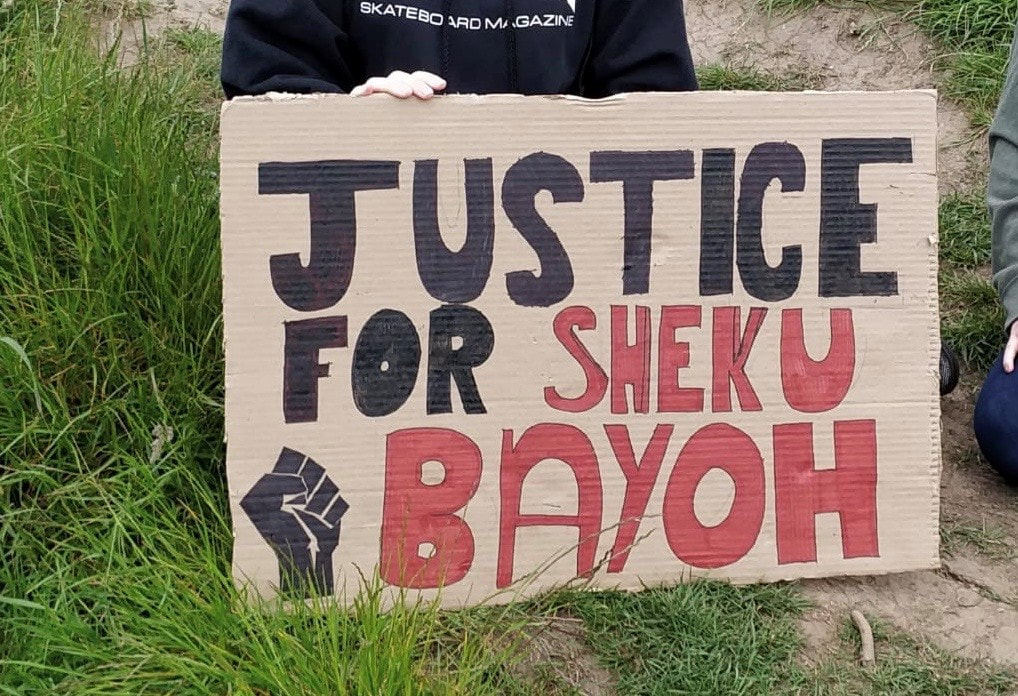|
|
|
Sheku Bayoh died shortly after he was arrested by up to nine police officers in the early hours of 3 May 2015 on a quiet street in Kirkcaldy, a small town on the east coast of Scotland. Sheku’s mother had encouraged him to move to Scotland to be near his sister because she thought a young black man would be safer in Scotland than in London. CCTV footage has shown that Sheku was on the ground and restrained within less than a minute of police officers arriving, yet the postmortem revealed he had 32 injuries to his body. The Lord Advocate of Scotland announced in November 2019 that no police officer would be charged for Sheku’s death, four and a half years after Sheku died.
I wrote my Identities article, 'Containment, state racism and activism: the Sheku Bayoh justice campaign', not only to shed light on the circumstances of how Sheku died after he was arrested but to attempt to explain why deaths in police custody happen, why they are disproportionately of black people, and to develop an understanding of why the families who have lost loved ones find it so hard to get justice or even an adequate explanation from the police of why. I argue that the state has an interest in containing working class struggles and that state racism is used as part of the containment strategy that explains black deaths in police custody. I use a historical and theoretical analysis of how racism has been deployed by the state in immigration legislation where the black presence was problematised. The problematic black presence discourse has historically been a key feature of the policing of black communities – although this has evolved in several ways it nevertheless continues to produce a racial criminalisation of black people.
The often racist policing of black people has led to their disproportionate numbers in prison and in stop and search statistics, as well as greater force in the arresting of black people, something which partly explains why more black people die whilst being arrested or when they are in custody. Numerous justice campaigns have been formed to establish how a family’s loved one died, but there have been no convictions of police officers since 1969.
Sheku’s family established the Sheku Bayoh justice campaign shortly after he died, which is currently led by his sister Khadijah. However, the campaign was silenced during much of the official investigation that immediately followed Sheku’s death because the family were told that their activism could interfere with it. The campaign was contained in several other ways too. The investigation into Sheku’s death was led by ex-police officers who had served 35 years at senior levels within the police. In 2015, the Herald newspaper found that within the body which investigates such incidents, 'Of the eleven individuals who are in senior positions, eight are ex-police – around 73%'. I refer to such normal everyday workings of state structures and processes as 'institutional containment'. Thus, and as Stuart Hall and colleagues argued in Policing the Crisis, it is the everyday and normal working of the police and judicial system that contains activist demands for justice. Shaku’s death was often reported in a racialised way, and stories that were printed in newspapers were often anonymously sourced from the police. This is common in black deaths in police custody and I refer to this as 'racialised state talk'. Here, the state racism of the police was ideologically reproduced in the media and operated to contain the family’s demands for justice. It has been over five years since Sheku’s death, and even during a global pandemic the resurgence of the Black Lives Matter movement following the killing of George Floyd in Minneapolis reached Scotland and allowed Sheku’s family to once again remind us that black people have died at the hands of police in Britain too, and that their families struggle on for justice. References: Hall, S, Critcher, C, Jefferson, T, Clarke, J & Roberts, B. 1978. Policing the crisis: mugging, the state and law and order. London: The MacMillan Press Limited. Hutcheson, P. 2015. Revealed: the police watchdogs with close ties to the police. The Herald, 6 September 2015.
Blog post by Smina Akhtar, University of Glasgow, UK
Read the full article: Akhtar, Smina. Containment, state racism and activism: the Sheku Bayoh justice campaign. Identities: Global Studies in Culture and Power. DOI: 10.1080/1070289X.2020.1813460
0 Comments
Your comment will be posted after it is approved.
Leave a Reply. |
|
Explore Identities at tandfonline.com/GIDE |
|
The views and opinions expressed on The Identities Blog are solely those of the original blog post authors, and not of the journal, Taylor & Francis Group or the University of Glasgow.

